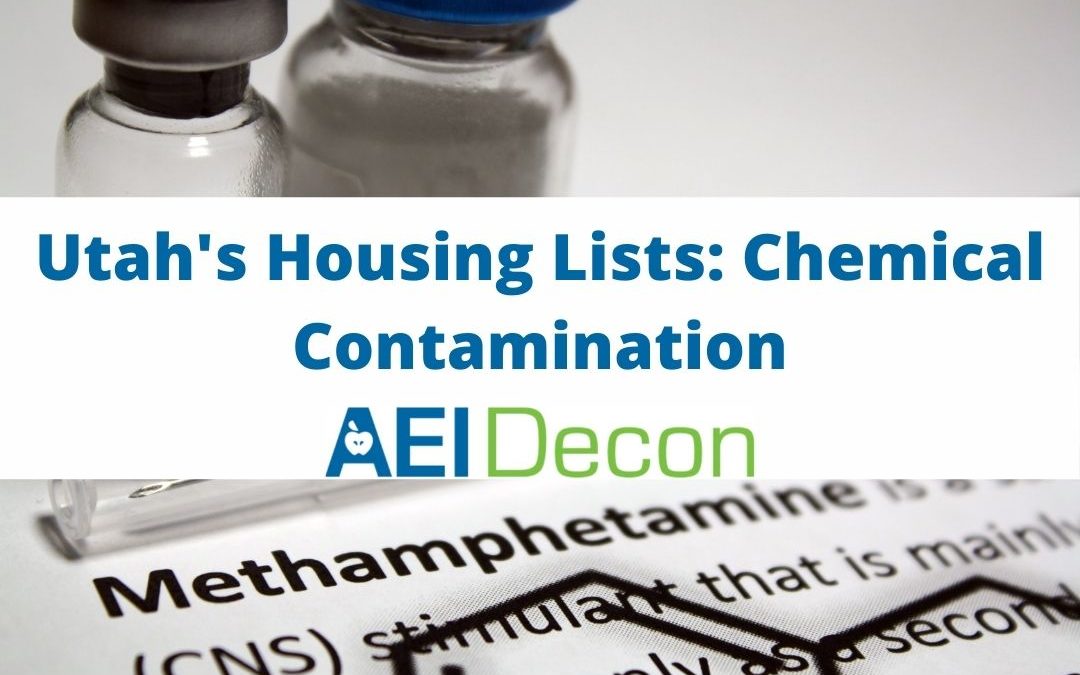Methamphetamine is a highly addictive substance that creates a strong sense of euphoria. It affects the central nervous system and can cause many complications. These include seizures, cardiac arrest, brain damage, and more.
Thanks to its molecular structure, meth can do some pretty incredible (albeit alarming) things. For instance, meth changes phases between liquid, solid, and gas quite easily. This allows this substance to linger in your home or property as a residue. It can also reenter the environment through off-gassing, dermal absorption, and cross-contamination. Furthermore, meth crosses the nonpolar barrier between our blood vessels and brains quite rapidly, yet it is difficult for the body to metabolize completely. This accounts for some of its profound and lingering impacts on the body and mind.
For these reasons and many more, Utah legislators passed the Illegal Drug Operations Site Reporting and Decontamination Act. This piece of legislation empowers the Utah Department of Health to oversee decontamination standards of contaminated properties. (See Utah’s Administrative Code 392-600 for more information.) It also requires Utah’s local health departments to maintain a list of chemically contaminated properties.
Utah’s Chemically Contaminated Housing Lists
Homes can find their way onto one of Utah’s Chemically Contaminated Housing Lists via a few different routes. One of the most common scenarios includes law enforcement discovering a meth lab (or meth use) on a property. Under the law, they must then report it to the local health department. Next, the property is closed to entry, and the owners must choose how to proceed.
Naturally, many owners have concerns about having their property openly displayed on a public record, especially if they intend to sell. However, there are certain advantages to such lists. For starters, meth production is an explosive and toxic process. So, these lists contribute to community safety via transparency and open disclosure. They also improve adherence to decontamination standards by increasing a sense of accountability and visibility.
Even so, keep in mind that the general public doesn’t spend much time checking for meth house updates. In fact, in our experience, the stigma and impact on the buying and selling process are never as severe as most people fear. There are also plenty of potential solutions for meth-contaminated homes, including decontamination (after which the health department can remove the house from the list.)
You could also consider selling the house as in. Indeed, many investors purchase meth houses at reasonable prices. And as decontamination can come out of closing costs, meth is often a negotiable problem for many potential owners.
How Can I Remove My House From The Contaminated Properties List?
Each local health department is responsible for maintaining its own list. So, the conditions and requirements may vary slightly. In general, removal from the list takes place after we’ve completed our decontamination work plan and submitted our state-compliant test results to the county’s health department. But, of course, there are a few things to consider there.
For starters, the Utah Department of Health only accepts test results from Certified Decontamination Specialists. So plan on contacting one in your area either way. We even recommend talking with such a professional earlier in the decontamination process if possible. (That may allow you to avoid unnecessary steps and costly mistakes, potentially saving you time and money.)
You’ll also want to note that after the house has been successfully removed from Utah’s Chemically Contaminated Housing Lists, the records may still be visible elsewhere. It is possible, for example, to submit a GRAMA request to the health department to obtain information about a property. Similarly, if an agent comments about meth contamination on an MLS database, thier statements may be public and visible forevermore. (Your best bet, in such a situation, is to have your agent update the information with current details regarding successful decontamination.)
However, don’t let this worry you too much. In all our years as Certified Decontamination Specialists, we’ve never really seen much impact on the value of a home once decontamination is complete. Though, that absolutely hinges on successful and reliable meth-removal methods and testing. That’s partially why we suggest booking an early consultation.
Of course, if you’re in Utah, AEI Decon is here to help. We guarantee our work and we’re happy to help your sort out your next step. Give us a call to learn more at (801) 888-6698.

